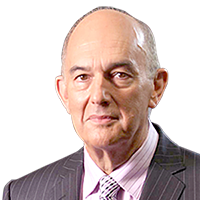Paul Bongiorno: Voice referendum debate too often involves racism and prejudice

The most civil thing that can be said about those who are mounting the core arguments of the ‘no’ case against the Voice referendum is that they are unaware of the depths of paternalism and racism in their arguments.
The point was made in a private email from NSW Supreme Court Judge Ian Harrison to Nationals MP Pat Conaghan after the politician’s contribution to the referendum-enabling debate in Parliament last week.
We know about it because the member for the NSW seat of Cowper was so incensed about it, he gave the email to The Australian, which duly published it as an exclusive purportedly showing the judge had crossed the line by offending the separation of powers.
That’s the doctrine demanding the judiciary should not interfere in political issues that could likely come before them. Except in this case there is at best a remote possibility a judge on the NSW Supreme Court would ever have to deal with constitutional matters arising out of the Voice.
Judge Harrison’s superior on the bench, Chief Justice Andrew Bell – contacted for comment – noted the communication was private and the controversy arising from it was all the work of Mr Conaghan.
Judge’s ‘complete sadness’
Although the Chief Justice observed it is generally prudent for judges to avoid public disputes, he did not say they are banned from feeling “complete sadness” and “despair” at displays that “lack human decency”.
These were Judge Harrison’s stated emotions as he listened to Mr Conaghan’s contribution.
Pat Conaghan, a former police officer – like Opposition Leader Peter Dutton – recounted Aboriginal horror stories he witnessed as a police prosecutor.
He told Parliament he saw in Kempsey “the disparities in the rates of domestic and family violence, the rates of incarceration, with the number of people outside the court mainly being the Indigenous population”.
Mr Conaghan said as a member of the joint select committee looking into the referendum legislation, he did not hear evidence how the Voice would “tangibly affect these issues”.
He characterised the referendum as “enshrining potential division in our constitution” and said it would “not encourage Australians to act and move forward as one”.
But the nub of his argument is a rejection of constitutional recognition at all, because this gives one group of Australians a special place due to their racial identity.
Ignored is the unique place in the history of this continent of those of Aboriginal and Torres Strait heritage.
Mr Conaghan in his speech, unlike Mr Dutton, did not say he supported legislating regional and local voices; perhaps the penny dropped for him that this would be doing the very thing he says he is opposing – singling out one group of Australians.
Raising the issue of race
What can’t be denied; it is the Dutton-led opposition which, with few exceptions, is stridently raising the issue of race.
Mr Dutton told Parliament the Voice would “re-racialise the country”.
The opposition ignores that its side of politics has often precisely used the existing race power in the constitution to intervene in the Northern Territory, impose cashless debit cards and set up Indigenous programs from Canberra because, like John Howard and his minister Mal Brough, they know what’s best.
Little wonder that independent Indigenous Senator Lidia Thorpe says that the “no campaign is looking more like a white-supremacy campaign that is causing a lot of harm”.
The special place of Indigenous Australians has been recognised by every federal government for decades, with ministers appointed to oversee the billions of dollars allocated to their welfare.

Peter Dutton warns about the ‘unforeseen circumstances’ of the Voice. Photo: AAP/TND
Judge Harrison left aside arguments over whether the Voice will “add anything practical to the lives of Indigenous Australians”; he said they “can argue about that forever”.
But he went to the spark that ignited this whole debate, namely the constitutional recognition of First Nations people that even Mr Dutton says an overwhelming majority of Australians would support.
The judge dismisses Mr Dutton and Mr Conaghan’s warning about “unforeseen circumstances” if the advisory Voice succeeds – like others learned in the law, Judge Harrison says “there are no sleeping constitutional issues here. It is simply a matter of human decency”.
‘Something subtly disgusting’
It is hard to argue with Justice Harrison that “there is something subtly disgusting” about the contention that the Voice promotes a false “spectre of harm to the Australian community”, which ignores the benefit of giving recognition to a “long-neglected section of our society”.
Prime Minister Anthony Albanese, in his Lowitja O’Donoghue Oration on Monday night, was confident Australians won’t succumb to the ‘no’ campaign’s scares because they have a healthy scepticism of doomsayers bolstered “by memories of all the predictions offered by the Chicken Littles of the past”.
On cue, Mr Dutton hit back, calling for a respectful debate.
He accused the Prime Minister of “name-calling people and others and suggesting that people are racists because they don’t support the Voice – it’s completely and utterly unacceptable”.
Playing the race card to defeat the Voice invites condemnation – as Mr Albanese said it is “simply unworthy of the alternative prime minister of this nation”.
Unworthy and utterly unacceptable.
Paul Bongiorno AM is a veteran of the Canberra Press Gallery, with more than 45 years’ experience covering Australian politics








